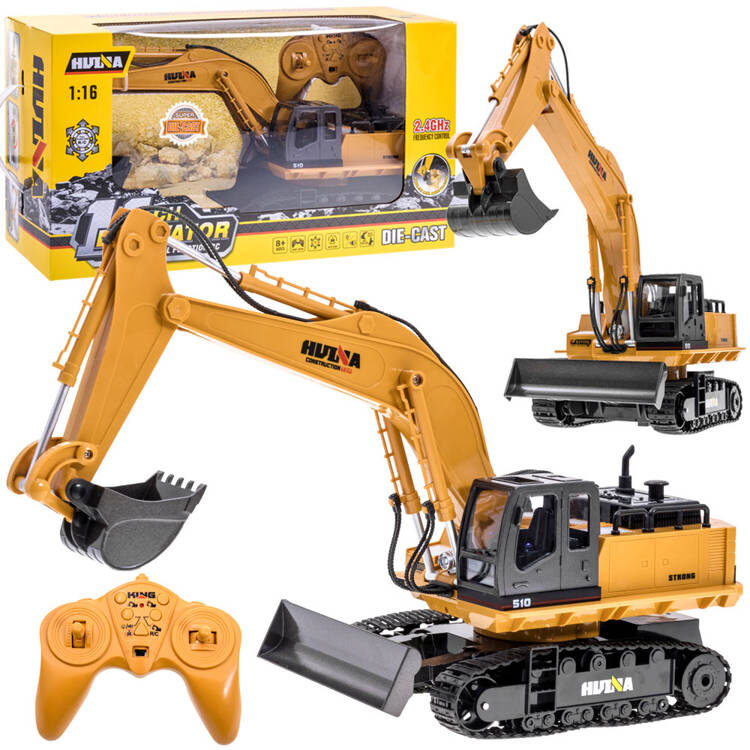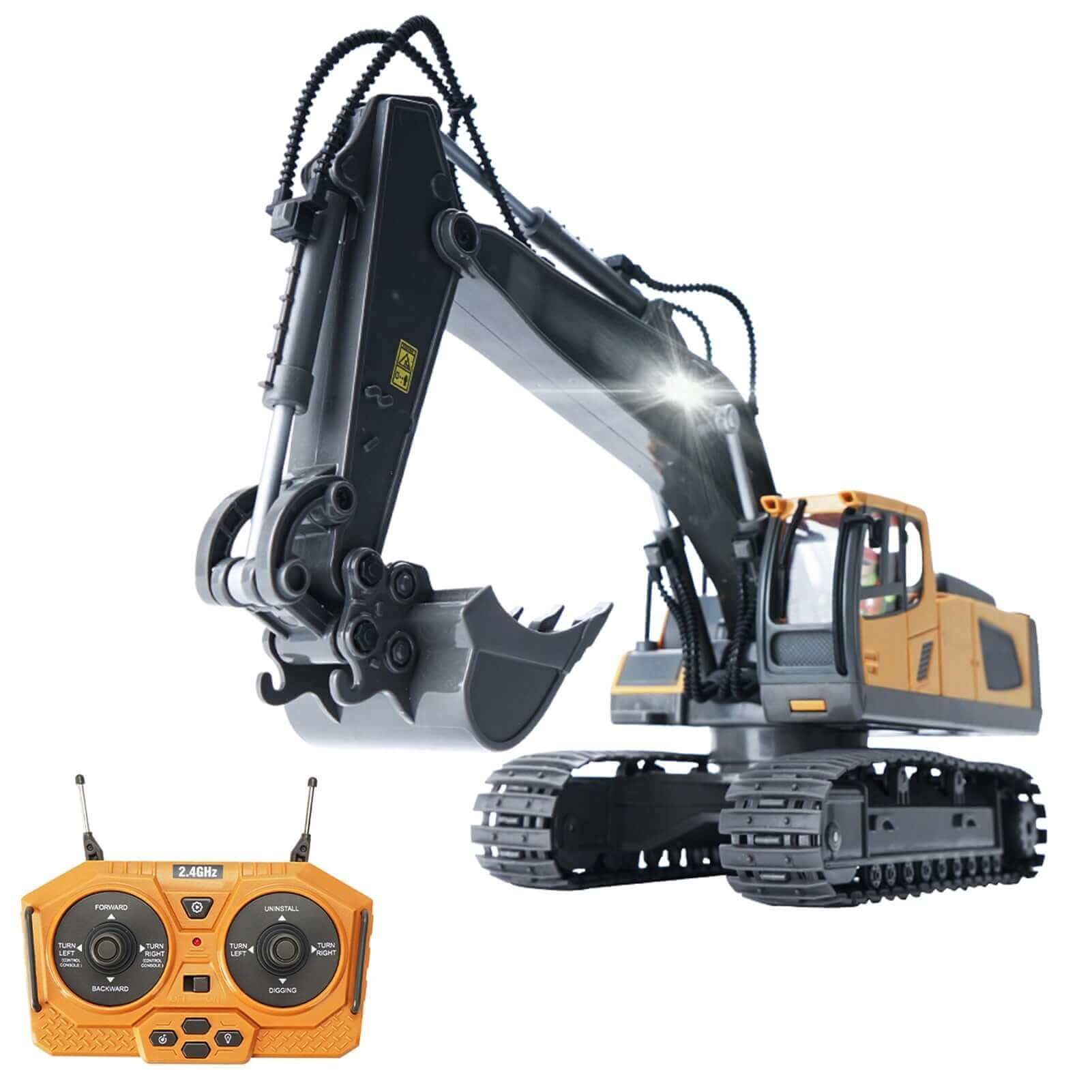Comprehending Exactly How Excavator Functions and Its Effect On Effectiveness
Excavators play a vital function in construction and mining operations, depending on an intricate interplay of hydraulic and mechanical systems. Their ability to carry out a selection of jobs depends upon both their layout and the technology integrated within. Recognizing these components can considerably affect operational performance and productivity. As improvements continue to improve the industry, one should think about how these modifications will certainly affect future practices and efficiency.
The Fundamentals of Excavator Mechanics

The Duty of Hydraulic Systems in Excavators
At the heart of excavator operation lies the hydraulic system, which plays an essential duty in powering the equipment's motions and functions. This system utilizes pressurized hydraulic liquid to move power, enabling different activities such as excavating, lifting, and swinging. By utilizing the principles of hydraulics, excavators can do tasks with impressive precision and force, boosting general functional efficiency.The hydraulic system consists of crucial parts, consisting of shutoffs, pumps, and cyndrical tubes, which interact to manage the circulation and instructions of the liquid. When the operator engages the controls, the hydraulic fluid is guided to certain cylinders, translating the driver's commands right into physical motion. This device enables responsive and smooth actions, which are vital in building and excavation settings. double e volvo rc excavator. The performance of the hydraulic system directly impacts the productivity and versatility of the excavator, making it an important aspect in modern excavation processes
Trick Components of an Excavator
Understanding the key parts of an excavator is crucial for comprehending exactly how this powerful equipment runs. An excavator consists of several substantial aspects, including the undercarriage, residence, boom, pail, and arm. The undercarriage provides security and mobility, typically including tracks or wheels to navigate different surfaces. The house consists of the engine and hydraulic systems, allowing the operator to control motion and power the machine. The boom expands from the home, making it possible for vertical reach, while the arm attaches to the container, helping with excavating and lifting operations.Additionally, the taxi houses the driver, equipped with controls for exact handling. Each of these components plays a vital role in the excavator's total capability, contributing to its performance and effectiveness on building websites. Comprehending these components aids in optimizing and preserving excavator efficiency, making certain tasks are finished securely and properly.
Add-on Adaptability and Its Advantages
Accessory versatility is a necessary element of excavators, making it possible for drivers to change in between numerous devices tailored for details jobs. This flexibility not just boosts work efficiency yet likewise adds to cost-effectiveness by lowering the need for numerous equipments. Understanding the different kinds of accessories offered can substantially influence the general efficiency and performance of an excavator on job websites.
Kinds of Accessories
While excavators are mainly recognized for their digging capabilities, their real versatility exists in the wide range of attachments available. These add-ons boost the excavator's capability, allowing it to carry out numerous tasks past excavation. Usual add-ons consist of pails (for excavating and scooping), hydraulic thumbs (for comprehending materials), and augers (for piercing holes) Grapples are made use of for taking care of and moving particles, while rippers can separate hard surface areas. Various other specialized accessories, such as plates and plows, make it possible for excavators to adjust to specific task requirements. This diversity not just boosts the device's energy throughout various sectors, consisting of demolition, building, and landscaping, however likewise permits operators to tailor their tools to meet certain job demands effectively.
Raised Task Efficiency
Optimizing work efficiency is a primary benefit of making use of various excavator add-ons. Different attachments enable an excavator to execute several tasks without needing to change tools, saving useful time and labor. For circumstances, using a hydraulic hammer can damage concrete while a bucket accessory can excavate dirt, making it possible for a seamless operations. This convenience lowers downtime associated with devices modifications and improves efficiency on-site. Furthermore, specialized add-ons improve precision in tasks such as grading or landscape design, her comment is here leading to greater quality end results. The capability to adapt to different work needs not just simplifies operations but likewise reduces the demand for added equipment, making sure that jobs are completed swiftly and successfully. Overall, accessory flexibility significantly adds to increased job effectiveness in excavation job.
Cost-Effectiveness and Versatility
Cost-effectiveness is a significant advantage of using versatile excavator add-ons. These add-ons permit a single excavator to perform numerous tasks, reducing the demand for extra machinery and labor - double e volvo rc excavator. By changing between pails, hammers, and grapples, drivers can take on different projects, from digging to demolition, thus making best use of tools application. This adaptability not only reduces operational prices yet likewise minimizes downtime connected with altering devices. In addition, the capability to customize excavators with specialized add-ons enhances productivity, as they can effectively deal with varied tasks according to task demands. To end, the combination of cost-effectiveness and versatility in excavator add-ons contributes to improved functional performance and resource allocation in building and excavation jobs

Advanced Innovation in Modern Excavators
Modern excavators are increasingly geared up with innovative innovation that changes excavation processes. Automation simplifies procedures, while improved fuel efficiency reduces functional costs. In addition, clever control systems enhance precision and security, noting a considerable evolution in excavation tools.
Automation in Excavation Processes
As excavation modern technology advances, automation has become a vital element in enhancing effectiveness and accuracy on work sites. Modern excavators are geared up with innovative automated systems that facilitate jobs such as grading, digging, and trenching with marginal operator intervention. These systems make use of sensing units, GPS, and artificial intelligence algorithms to assure accurate placing and deepness control, greatly lowering the margin for error. In addition, automation allows drivers to concentrate on strategic decision-making as opposed to hand-operated controls, bring about boosted productivity generally. Such innovations not only improve operations however likewise improve safety and security by lessening human mistake in intricate operations. Consequently, the integration of automation in excavation procedures stands for a substantial improvement in building and construction technology, driving the industry in the direction of higher effectiveness and efficiency.
Boosted Fuel Effectiveness
Improvements in technology have also brought about considerable enhancements in fuel effectiveness for modern excavators. Modern machines are outfitted with innovative engines that optimize power outcome while minimizing gas usage. These engines make use of cutting-edge burning technologies, such as turbocharging and direct gas shot, to enhance efficiency and efficiency. Additionally, lightweight products in building and construction reduce general weight, permitting less energy expense throughout procedure. The introduction of variable rate controls allows drivers to adjust engine efficiency according to particular tasks, even more decreasing fuel use. Consequently, these enhancements not just reduced operational prices yet additionally add to environmental sustainability by reducing discharges. Generally, improved gas performance in excavators is an essential advancement that strengthens efficiency and economic practicality in the building market.
Smart Control Systems
While drivers navigate significantly anchor complex work sites, smart control systems in excavators have actually arised as vital tools for improving efficiency and accuracy. These advanced innovations make use of algorithms and sensors to monitor different criteria such as load weight, surface problems, and functional performance. By instantly adjusting hydraulic functions, wise systems maximize machine efficiency, leading to boosted performance and reduced wear on elements. In addition, drivers benefit from intuitive interfaces that give real-time feedback and diagnostics, enabling notified decision-making. This integration of innovation not only enhances operations but likewise minimizes human error, adding to more secure work environments. As the building market continues to progress, wise control systems will certainly play an essential role fit the future of excavator effectiveness and efficiency.
Enhancing Functional Efficiency With Excavators
Excavators play an essential function in boosting operational performance across numerous building and construction and excavation tasks. Their convenience enables multiple jobs, consisting of product, excavating, and training handling, which simplifies operations and reduces the need for added tools. With effective hydraulic systems, excavators can perform heavy-duty tasks with precision, considerably reducing the time needed to total projects. The combination of advanced modern technology, such as GPS and automated controls, better enhances their operation, enabling operators to achieve better precision and reduce material waste. Additionally, contemporary excavators are made to consume less fuel and decrease discharges, adding to both expense savings and ecological sustainability. By using excavators successfully, building and construction groups can improve productivity, meet project due dates, and boost general site monitoring. This multifunctionality and effectiveness make excavators vital devices in the contemporary building and construction landscape.
The Future of Excavators in Building and Mining Industries
As the construction and mining markets evolve, the future of excavators is positioned for substantial improvement driven by technological advancement and changing functional needs. Advancements in automation and fabricated intelligence are improving excavator capacities, enabling for boosted precision and effectiveness in procedures. Autonomous excavators are emerging, lowering the need for human treatment and decreasing the risk of accidents.Moreover, the combination of telematics and IoT modern technology enables real-time tracking of equipment performance and anticipating maintenance, maximizing uptime. Eco-friendly styles, consisting of hybrid and electrical designs, are acquiring traction, lining up with sustainability goals within the industry.Additionally, using sophisticated products and lighter layouts improves fuel efficiency while preserving performance criteria. As these fads progress, excavators will play an essential role in meeting the enhancing needs for productivity and safety and security in building and construction and mining, eventually transforming operational landscapes.
Frequently Asked Concerns
Exactly How Do Climate Condition Impact Excavator Performance?

Climate condition substantially influence excavator efficiency, as rainfall and mud can hinder traction and stability, while extreme temperature levels might influence hydraulic systems. Operators has to adjust to these variables to ensure ideal capability and safety and security during procedures.
What Safety And Security Procedures Should Operators Adhere To While Making Use Of Excavators?
Security procedures for excavator operators include wearing proper personal protective equipment, performing pre-operation assessments, ensuring appropriate communication with ground workers, preserving a safe range from overhanging hazards, and sticking to established functional methods to stop accidents.
Just How Frequently Should Excavators Be Kept for Ideal Efficiency?
Excavators ought to be kept frequently to assure peak efficiency, commonly every 250 operating hours or as defined by the supplier. Routine checks boost reliability, stop unanticipated breakdowns, and extend the life expectancy of the tools.
What Is the Average Life Expectancy of an Excavator?
The ordinary life expectancy of an excavator normally varies from 10,000 to 15,000 hours of procedure. Factors influencing durability include upkeep techniques, running problems, and the high quality of the equipment itself, impacting overall efficiency and performance.

Can Excavators Operate on Unequal Surface Properly?
Excavators can run efficiently on unequal surface as a result of their expressed designs and adjustable tracks. These functions allow them to keep stability and traction, allowing reliable procedure in tough environments generally come across in building and construction and landscape design tasks. Each of these elements plays an important duty in the excavator's general performance, contributing to its performance and effectiveness on building and construction sites. Taking full advantage of task effectiveness is a key benefit of using various excavator accessories. While operators browse increasingly complex job sites, smart control systems in excavators have arised as vital devices you could check here for enhancing efficiency and precision. Excavators play a vital role in boosting functional efficiency throughout various building and construction and excavation tasks. Breakthroughs in automation and artificial intelligence are improving excavator capabilities, permitting for enhanced precision and performance in operations.